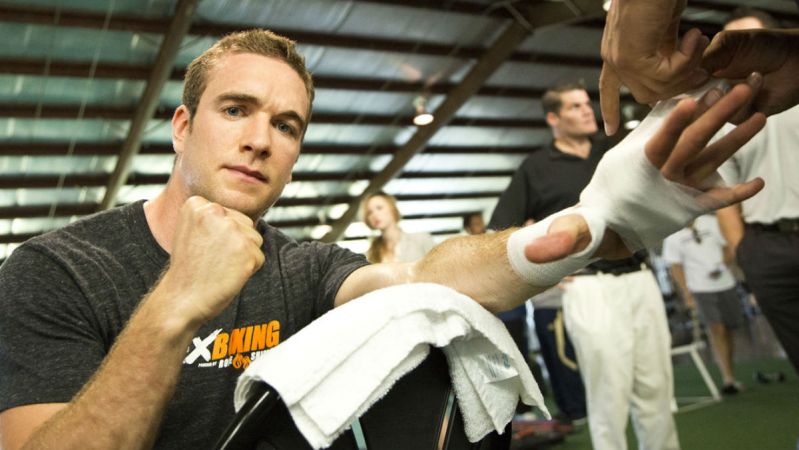
Ranked in the top three boxers in the light heavyweight category by the World Boxing Organization, Mike Lee is sitting pretty with a 20-0 record that includes 11 knockouts. But you’d never guess this powerhouse has a degree in finance from University of Notre Dame, battles a chronic autoimmune disease, and turned down a lucrative career on Wall Street to pursue boxing.
The Manual sat down with Lee to hear how he turned from finance boy to boxer, get some diet and exercise tips (you can find much-needed fitness inspiration on his Instagram), and learn the secret trick he uses to manifest his wins.
The Manual: So … you’re a boxer with a degree in finance?
Mike Lee: I was always good at two things: numbers and fighting. Those were things I loved. I started working at the Chicago Board of Trade during the day, took the test I needed to trade commodities, and at night I was in the gym boxing.

TM: I’ve heard your first boxing class was a wreck.
ML: I was eight-years-old and sparred a kid that was 10, bigger than me, and he beat me up. I ran to the bathroom and my nose was bleeding. I remember thinking, “I’m never doing this again.” My dad came in and told me how proud he was that I stayed in there and didn’t quit. So I thought, “I’m not going to quit,” and went back the next day. Eventually, I got better and started sparring pros before I got my driver’s license. I would do anything not to lose.
TM: Did you always dream of being a pro boxer?
ML: I didn’t really care. My first big dream was going to Notre Dame. This stemmed from people around me saying I’d never get in. You tell me I cannot do something, I’m going to find a way to do it. I was on the phone constantly bugging them about letter and grades I needed. I was let in my sophomore year.
I learned very early in my career to visualize every fight coming up … There’s a lot of strength in sitting down and visualizing that moment.
TM: After graduation, you turned down a career on Wall Street?
ML: I had a couple offers— investment banking, a couple firms for trading. But no right offer. I realized I could turn pro and knew in my heart that was what I needed to be.
TM: During the next 20 wins, you battled ankylosing spondylitis (an autoimmune disease that’s like very intense arthritis of the spine). What has that felt like?
ML: I was first diagnosed because I was going through so much joint pain, fatigue, and headaches. I was 26, undefeated, 12-0, in national Subway commercials, Super Bowl ads, and all of that was taken from me. I went from doctor to doctor being misdiagnosed, being told it was all in my head, and I started getting anxiety. It took a lot to get out of that, but I’m so glad it happened. It made me a different human being, transforming me as nothing like pain could … it made me grateful. I started practicing visualization and meditation and was consciously thinking what I wanted my body to do. I started reading a lot.

TM: What books helped change your mindset?
ML: I love Law of Attraction books. Right now I’m reading Ask and It Is Given. My favorites are Man’s Search for Meaning by Viktor Frankl and anything by neuroscientist Joe Dispenza.
TM: You’re also a fan of CBD oil (cannabidiol, a chemical compound in marijuana).
CBD has really helped me with everything from pain to inflammation to remaining calm. There’s no THC in it. I’m actually launching a CBD line at the end of June.
TM: What does a pro boxer eat?
ML: Food was a big change for me also. Not that I was eating cheeseburgers every day, but I did a lot of tests and learned about how misguiding food information can be. Now my rule is: if it wasn’t around 10,000 years ago, I don’t eat it. Some people call it Paleo or caveman diet, but for me, it’s about no gluten, no dairy, and I don’t do eggs, artificials, or GMOs.
TM: Do you have any workout or training tips for the guys at The Manual?
ML: I encourage people to get into boxing— of course, I’m biased. Do things that you love. If you hate running or the stair master, you’re going to quit. Go hiking, paddle boarding, rock climbing to get momentum. Have fun.
TM: What’s your go-to pump song?
ML: Something that makes me want to dance and move. I never got into heavy rap. I prefer Stevie Wonder, Michael Jackson, and Bruno Mars.

TM: What’s the biggest lesson that boxing has taught you?
ML: Visualization. I learned very early in my career to visualize every fight coming up, what it smelled like, sounded like. I’d picture different scenarios so when I got into the ring my brain had been there. I apply that to life now. Maybe I’m about to do an interview on TV or a speech, a presentation. There’s a lot of strength in sitting down and visualizing that moment and feeling what you want that moment to look like. Your brain doesn’t know the difference between perception and reality. Some of the best athletes and entrepreneurs in the world do this.
TM: When’s your next fight?
ML: Slated for June 8. I’ll be competing for the WBO Jr. World Title.
TM: Last but not least, if you could spar with anyone, dead or alive, who would it be?
ML: Definitely Muhammad Ali.


